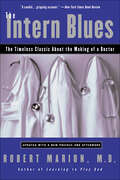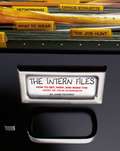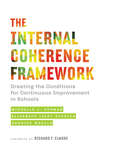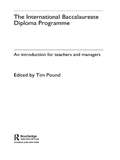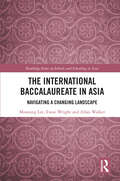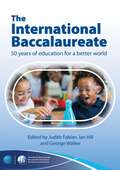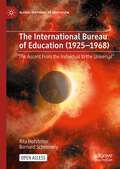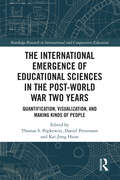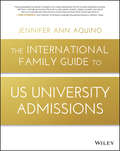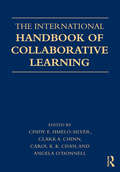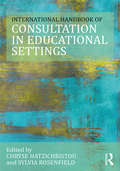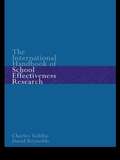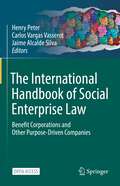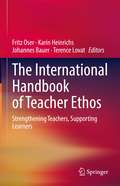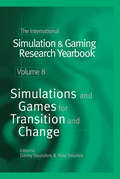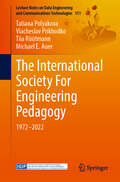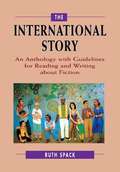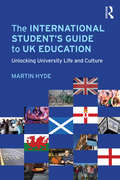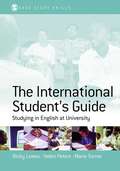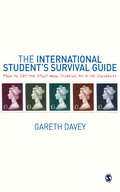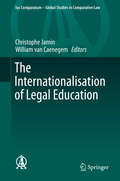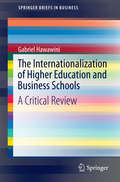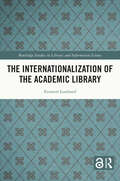- Table View
- List View
The Intern Blues: The Timeless Classic About the Making of a Doctor
by Robert MarionThe classic “gripping account” of three young doctors in training at a New York City hospital, updated with a new preface and afterword (The New York Times Book Review).While supervising a small group of interns at a major New York medical center, Dr. Robert Marion asked three of them to keep a careful diary over the course of a year. Andy, Mark, and Amy vividly describe their real-life lessons in treating very sick children; confronting child abuse and the awful human impact of the AIDS epidemic; skirting the indifference of the hospital bureaucracy; and overcoming their own fears, insecurities, and constant fatigue. Their stories are harrowing and often funny; their personal triumph is unforgettable.This updated edition of The Intern Blues includes a new preface from the author discussing the status of medical training in America today and a new afterword updating the reader on the lives of the three young interns who first shared their stories with readers more than a decade ago.“Thought-provoking, informative.” —Publishers Weekly‘The diary format effectively dramatizes the often-agonizing decisions and compromises that are made in the face of sleepless nights and inexperience . . . an important book for anyone contemplating the long, arduous task of becoming a doctor.” —Library Journal
The Intern Files
by Jamie Fedorko Dwight AllottIn today's highly competitive job market, an internship at the right company can be the first step to building a career. But how do you get the gig of your dreams? And once in the door, how do you figure out what to wear, whether it's okay to hook up with a coworker, and how to suck it up when you're smarter than your boss?
The Internal Coherence Framework: Creating the Conditions for Continuous Improvement in Schools
by Michelle L. Forman Elizabeth Leisy Stosich Candice BocalaThe Internal Coherence Framework presents a system of research-based practices for assessing and developing the conditions that support adult and student learning in schools. Internal coherence is defined as the ability of educators in a school or system to connect and align resources to carry out an improvement strategy, engage in collective learning, and use that learning to provide students with richer educational opportunities. The internal coherence framework featured in the book brings together three important domains of research: leadership for learning, organizational improvement, and instructional efficacy. School or system leaders who progress through this book with colleagues will develop a shared vision for ambitious teaching and learning anchored in the instructional core; organize the work of the leadership and teacher teams to advance this vision; and build psychologically safe team, school, and system cultures to support the risk taking and constructive challenges necessary to move schools or systems to the next level of performance. At the heart of the book is a survey and rubric that can help schools better understand their strengths and weaknesses and the kinds of resources they need to support student learning. The book blends theory and practice to bring tested wisdom to bear on critical issues of education leadership and professional learning.
The International Baccalaureate Diploma Programme: An Introduction for Teachers and Managers
by Tim PoundThe International Baccalaureate (IB) is a respected qualification gaining increasing currency around the world, and which has been adopted by a wide variety of schools, both public and private. In the UK, growing dissatisfaction with the A-level system has led to an intense debate about alternative qualifications, and in many schools IB courses have been introduced alongside conventional A-level courses.This practical introduction to the IB takes a balanced look at the pros and cons and features a wealth of advice from those actually involved in teaching and implementing it in schools. Providing comparative material on how IB courses differ from A-levels and a subject-by-subject account of best practice in teaching the IB, this book offers a rich source of practical advice for teachers, school leaders or managers involved in teaching or implementing the IB programmes.
The International Baccalaureate in Asia: Navigating a Changing Landscape (Routledge Series on Schools and Schooling in Asia)
by Allan Walker Moosung Lee Ewan WrightDrawing on extensive scholarly work, datasets, and experience with International Baccalaureate (IB) schools in Asia, this book illuminates contemporary debates, discussions, and discoveries surrounding IB schools in the region. Schools adopting IB programmes are growing exponentially worldwide, where Asia has seen the fastest growth since 2000. By critically exploring the roles, practices, and impacts of IB schools, this book enhances our understanding of whether and how IB programmes can drive improvements in school practices and systems in Asia.The book is organised into four parts and 12 chapters, aiming to discern “the light and shadow” of schools implementing IB programmes. Part 1 provides insights into International Baccalaureate Diploma Programme (IBDP) students' learning experiences and outcomes. Part 2 focuses on school leadership, examining the role of leadership in programme implementation and its relationship with IBDP student achievement. Part 3 offers a comparative perspective on the IB, exploring topics such as the pedagogical characteristics of the Middle Years Programme (MYP), the introduction of IB programmes into local and national education systems, and comparing the promised and actual benefits between the IBDP and other international programmes. Finally, Part 4 addresses two critical issues related to the expansion of IB programmes in Asia: the introduction and operation of IB programmes within national contexts and the emergence of educational stratifications and inequalities by the expansion of IB schools. Built on substantial data and empirical studies, this book fills a crucial gap in understanding the evolving nature of IB programmes in Asia. It provides readers with a critical and comprehensive understanding of the changing landscape of IB schooling practices and systems in the region.This book is an invaluable resource for academics, educators, scholars, and graduate students in the fields of educational leadership and administration, comparative and international education, higher education, and education policy and governance.
The International Baccalaureate: English language edition
by Ian Hill George Walker Judith FabianTo celebrate its 50th anniversary, the IB proudly invites you to read about the first half-century of its ongoing story. Written by a series of significant figureheads and stakeholders, this book describes – and celebrates – the ways in which the IB has seized the opportunity not only to address the need for an internationally recognized certification of educational achievement, but also to frame a global vision for values-based learning that improves the prospects for a better and more peaceful world. Contributors: Carolyn Adams; Sir John Daniel; Judith Fabian; Howard Gardner; Laura Gardner; Jenny Gillett; Matt Glanville; Judith Guy; Robert Harrison; Gareth Hegarty; Ian Hill; Carol Inugai-Dixon; Siva Kumari; Andrew Macdonald; Andrew Maclehose; Pilar Quezzaire; Angela Riviere; Dominic Robeau; George Rupp; HRH Princess Sarvath El Hassan of Jordan; Anthony Tait; Nicholas Tate; George Walker.
The International Baccalaureate: English language edition
by Ian Hill George Walker Judith FabianTo celebrate its 50th anniversary, the IB proudly invites you to read about the first half-century of its ongoing story. Written by a series of significant figureheads and stakeholders, this book describes – and celebrates – the ways in which the IB has seized the opportunity not only to address the need for an internationally recognized certification of educational achievement, but also to frame a global vision for values-based learning that improves the prospects for a better and more peaceful world. Contributors: Carolyn Adams; Sir John Daniel; Judith Fabian; Howard Gardner; Laura Gardner; Jenny Gillett; Matt Glanville; Judith Guy; Robert Harrison; Gareth Hegarty; Ian Hill; Carol Inugai-Dixon; Siva Kumari; Andrew Macdonald; Andrew Maclehose; Pilar Quezzaire; Angela Riviere; Dominic Robeau; George Rupp; HRH Princess Sarvath El Hassan of Jordan; Anthony Tait; Nicholas Tate; George Walker.
The International Bureau of Education: "The Ascent From the Individual to the Universal" (Global Histories of Education)
by Rita Hofstetter Bernard SchneuwlyThis open access book offers a critical analysis of the history of the International Bureau of Education (IBE) from its founding in 1925 to its integration into UNESCO in January 1969. Based on the conceptual and methodological tools of the transnational turn and on archives, fully exploited for the first time by the research team, this book enriches knowledge of the phenomena of globalization. It does so in a field, education, which is currently one of those most invested in globalization, but whose sociogenesis in the era of its first period of institutionalization remains to be explored more profoundly. The authors do this by analyzing how the actors of the IBE tried to realize their aspiration towards universal aims in education, the contradictions they were confronted with, the causes they invested in, their operating mode and the governments and international organizations with which they cooperated.
The International Emergence of Educational Sciences in the Post-World War Two Years: Quantification, Visualization, and Making Kinds of People (Routledge Research in International and Comparative Education)
by Thomas S. Popkewitz; Daniel Pettersson; Kai-Jung HsiaoThe book brings together contributions from curriculum history, cultural studies, visual cultures, and science and technology studies to explore the international mobilizations of the sciences related to education during the post-World War Two years. Crossing the boundaries of education and science studies, it uniquely examines how the desires of science to actualize a better society were converted to the search for remaking social life that paradoxically embodied cultural differences and social divisions. The book examines how cybernetics and systems theories traveled and were assembled to turn schools into social experiments and laboratories for change. Explored are the new comparative technologies of quantification and the visualization of educational data used in the methods of mass observation. The sciences not only about the present but also the potentialities of societies and people in the psychologies of childhood; concerns for individual development, growth, and creativity; teacher education; and the quantification and assessments of educational systems. The book also explores how the categories and classifications of the sciences formed at intersections with the humanities, the arts, and political practices. This informative volume will be of interest to researchers, academics, and postgraduate students in the fields of curriculum studies, the history of the social sciences, the history of education, and cultural studies, and to educators and school leaders concerned with education policy.
The International Family Guide to US University Admissions
by Jennifer Ann AquinoExpert guidance for international families and students applying for admission to US universities Written by an experienced international educator and counselor, The International Family Guide to US University Admissions is an indispensable resource for the vast and increasing number of students applying for places at US Universities each year. Beginning with an introduction that explains to both students and parents how the book works and why, it offers milestones that must be completed during said application time period, a tried-and-true handbook that corresponds with each chapter, pop-outs that provide expert insight and resources that you should utilize throughout the process. Every year, hundreds of thousands of international students and their families must go through the painstaking, complicated, confusing and culturally baffling process that is US university admissions. Until now, there has been no single resource for readers to turn to for holistic, accurate and up-to-date advice on the subject. Following the timeline of the US university admissions cycle, the book guides the parents and the student through the entire process in order to ensure that they are pacing themselves appropriately – from preparation to submission and through to applying for student visas. It serves as an advisor throughout the process, providing insightful advice by parents and students that are relevant to specific milestones. With the help of this book, you'll discover how to make sense of the US admissions system – from start to finish. Understand the application and evaluation process in depth in order to be an informed and successful applicant Make your schooling selection from over 3,000 US universities by understanding what would make a good fit for the student Learn what is expected of you in writing essays, why it is important, and how to create beautiful, genuine writing pieces reflective of your outlook in life Enjoy case studies and words of advice from the author's former students and their families Understand the difference between the SAT and ACT exams Whether you're an international student living outside of the US or an ex-pat living abroad, you'll find answers to all of your questions – all in one place.
The International Handbook of Collaborative Learning (Educational Psychology Handbook)
by Cindy E. Hmelo-Silver Clark A. Chinn Carol K. K. Chan Angela M. O’DonnellCollaborative learning has become an increasingly important part of education, but the research supporting it is distributed across a wide variety of fields including social, cognitive, developmental, and educational psychology, instructional design, the learning sciences, educational technology, socio-cultural studies, and computer-supported collaborative learning. The goal of this book is to integrate theory and research across these diverse fields of study and, thereby, to forward our understanding of collaborative learning and its instructional applications. The book is structured into the following 4 sections: 1) Theoretical Foundations 2) Research Methodologies 3) Instructional Approaches and Issues and 4) Technology. Key features include the following: Comprehensive and Global – This is the first book to provide a comprehensive review of the widely scattered research on collaborative learning including the contributions of many international authors. Cross disciplinary – The field of collaborative learning is highly interdisciplinary drawing scholars from psychology, computer science, mathematics education, science education, and educational technology. Within psychology, the book brings together perspectives from cognitive, social, and developmental psychology as well as from the cross-disciplinary field of the learning sciences. Chapter Structure – To ensure consistency across the book, authors have organized their chapters around integrative themes and issues. Each chapter author summarizes the accumulated literature related to their chapter topic and identifies the strengths and weaknesses of the supporting evidence. Strong Methodology – Each chapter within the extensive methodology section describes a specific methodology, its underlying assumptions, and provide examples of its application. This book is appropriate for researchers and graduate level instructors in educational psychology, learning sciences, cognitive psychology, social psychology, computer science, educational technology, teacher education and the academic libraries serving them. It is also appropriate as a graduate level textbook in collaborative learning, computer-supported collaborative learning, cognition and instruction, educational technology, and learning sciences.
The International Handbook of Consultation in Educational Settings (Consultation, Supervision, and Professional Learning in School Psychology Series)
by Sylvia Rosenfield Chryse HatzichristouThe rapid changes in the composition of school-age youth around the world have catalyzed a growing concern about how to address children’s mental health and education. Grounded in this increasingly global perspective, The International Handbook of Consultation in Educational Settings is designed to provide a multicultural/transnational approach to consultation theory, research, training, and practice in educational settings. With chapters written by geographically diverse and prominent scholars across the field of school psychology, this handbook captures the range of ways in which consultation services are trained, implemented, and researched internationally. Written for practitioners, researchers, faculty members, and graduate students in the fields of school psychology, school counseling, special education, and educational psychology, this volume is the first of its kind to provide a comprehensive look at consultation in learning environments across the world. The International Handbook of Consultation in Educational Settings offers various perspectives on models, implementation, training, and research on school consultation. After an introduction to the volume by the editors, contributors to Part II examine school-based consultation around the world to explore how consultation services are implemented in different countries. Part III addresses cross-cultural issues in consultation, particularly at a systems level. Part IV presents themes related to processes and issues in the implementation of consultation by focusing on approaches in various countries. The chapters in Part V focus on consultation training, offering insights into the development of students and professionals into effective consultants in cross-cultural and systemic contexts. Part VI describes how practitioners can contribute to the body of research on consultation through careful planning and implementation of their work. Finally, the editors summarize key concepts and findings in a concluding chapter.
The International Handbook of School Effectiveness Research
by David Reynolds Charles TeddlieWhat constitutes quality schooling? What are the implications for educational practice and administration? The text looks at these questions and examines international research evidence and reform initiatives with particular emphasis on North America, UK, Australasia and the Third World. It offers a synopsis of the Third World School Effects Research (SER). The authors claim that the challenges now facing educational leaders is to find a balance between SER and the other school movements and to ask more demanding questions of our educational systems.
The International Handbook of Social Enterprise Law: Benefit Corporations and Other Purpose-Driven Companies
by Henry Peter Carlos Vargas Vasserot Jaime Alcalde SilvaThis open-access book brings together international experts who shed new light on the status of social enterprises, benefit corporations and other purpose-driven companies. The respective chapters take a multidisciplinary approach (combining law, philosophy, history, sociology and economics) and provide valuable insights on fostering social entrepreneurship and advancing the common good.In recent years, we have witnessed a significant shift of how business activities are conducted, mainly through the rise of social enterprises. In an effort to target social problems at their roots, social entrepreneurs create organizations that bring transformative social changes by considering, among others, ethical, social, and environmental factors. A variety of social enterprise models are emerging internationally and are proving their vitality and importance.But what does the term “social enterprise” mean? What are its roots? And how does it work in practice within the legal framework of any country? This handbook attempts to answer these questions from a theoretical, historical, and comparative perspective, bringing together 44 contributions written by 71 expert researchers and practitioners in this field. The first part provides an overview of the social enterprise movement, its evolution, and the different forms entities can take to meet global challenges, overcoming the limits of what governments and states can do. The second part focuses on the emergence of benefit corporations and the growing importance of sustainability and societal values, while also analyzing their different legal forms and adaptation to their regulatory environment. In turn, the last part presents the status quo of purpose-driven companies in 36 developed and emerging economies worldwide.This handbook offers food for thought and guidance for everyone interested in this field. It will benefit practitioners and decision-makers involved in social and community organizations, as well as in international development and, more generally speaking, social sciences and economics.
The International Handbook of Teacher Ethos: Strengthening Teachers, Supporting Learners
by Terence Lovat Johannes Bauer Fritz Oser Karin HeinrichsThis volume is the first handbook that brings together cutting-edge international research on teacher ethos from a broad array of disciplines. The main focus will be on research that illustrates current conceptualizations of ethos and its importance for acting effectively and responsibly in and out of the classroom. Research will encompass updated empirical and philosophical work that points to the difference in learning when teaching is practised as a moral activity instead of a merely functional one. Authors are among the world’s foremost researchers whose work crosses over from moral education into psychology, neuroscience, sociology, philosophy, pedagogy, and curriculum, drawing on these various fields of research. Today, more than ever, we understand that teachers, like other professionals, need more than subject-matter expertise for acting responsibly and doing their best in their daily duties. Doing so requires possessing a guiding system of professional ethics, moral positioning, goals, norms, and values – in other words: a professional ethos. While the handbook concentrates on Western domains in the current era, the work will extend to other cultures and times as well. With this comprehensive range of perspectives, the book will be attractive and useful for researchers on teachers and teaching as well as for teacher educators, curriculum designers, educational officials, and, last-but-not-least, anyone who is interested in what makes a good teacher. This volume is also a tribute to Fritz Oser, a leading scholar in research on ethos, who sadly passed-away during the compilation of this handbook.
The International Simulation & Gaming Research Yearbook
by Danny Saunders Nina SmalleyThe eighth volume in the "Simulation and Gaming Research Yearbook" series brings together topical and authoritative contributions from international professionals involved in the use of games and simulations. There are examples drawn from a wide range of countries.
The International Society For Engineering Pedagogy: 1972–2022 (Lecture Notes on Data Engineering and Communications Technologies #151)
by Michael E. Auer Tiia Rüütmann Tatiana Polyakova Viacheslav PrikhodkoThis book is dedicated to the history and contemporary activities of IGIP that occupies a unique position among world organizations who are focused on Engineering Education. We are currently in the process of transforming education at all levels. This applies in particular to the professional and academic education and training of engineers.To face these current real-world challenges, higher education has to find innovative ways to quickly respond to these new needs. This and completely new technologies in education require specifically new and adapted approaches in Engineering Pedagogy.This book is a continuation of IGIP’s tradition to summarize and analyze intermediate results and foresee the main trends of further development of Engineering Pedagogy. It is written for the 50th anniversary of IGIP and contains valuable historic information as well as memories and opinions of IGIP members and specialists in Engineering Pedagogy.This book is intended for teachers at technical colleges and universities, students, post-graduates, administrative staff of educational institutions, staff of state educational ministries and committees, members of other societies with interest in Engineering Education, staff of personnel agencies, and everyone who is interested in Engineering Education and Pedagogy. Interested readership includes furthermore policymakers, academic researchers in pedagogy and learning theory, schoolteachers, the learning industry, further and continuing education lecturers, etc.
The International Story: An Anthology with Guidelines for Reading and Writing about Fiction
by Ruth SpackThe International Story is an anthology with guidelines for reading and writing about fiction.
The International Student's Guide to UK Education: Unlocking University Life and Culture
by Martin HydeAre you thinking of studying at university in Britain? Do you feel confused about which course is best for you, which university to choose, and how to apply? Are you wondering about what kinds of challenges you will be faced with, how best to approach them and how to overcome them? If so, this guidebook is for you. Honest and accurate, this book acts as an international student introduction and cultural guide to UK Higher Education. It informs and guides students in their preparation for all aspects of UK HE, from university selection and application through to participation, and provides a clear understanding of how British universities function. Helping international students make the most of the many opportunities that university offers, this text will expand your knowledge of UK Higher Education with regards to: Application procedures Finances Self-awareness, cultural understanding and adaptation (social and academic) University administrative procedures, facilities and support Work and career information and advice. The International Student’s Guide to UK Education is a comprehensive guide that will help students to develop critical and reflective ability in order to become independent, well-informed and empowered decision makers.
The International Student's Guide: Studying in English at University (SAGE Study Skills Series)
by Helen Peters Marie Stephenson Ricki LowesThis book is intended for students from all language backgrounds other than English, attending or preparing to attend a university where the medium of instruction is English, particularly in the UK. The International Student's Guide helps you succeed at university, by sharing the experiences of many international students who have already attended a university in the UK. Every student is unique, with different abilities and needs. With this in mind, the authors provide you with practical information and help on a range of aspects of study. They focus on both spoken and written forms of communication, and deal with the approaches to thinking and learning which you will meet in higher education in the UK system. Written by experienced lecturers in language and learning, the book offers a wealth of advice and guidance on topics such as: ways of learning how to make the most of your own strengths working in seminars and groups writing in different forms, disciplines and at different levels assessment techniques such as exams and oral presentations. Whether you are embarking on a pre-degree foundation course or a postgraduate programme, this book will help you manage all the challenging aspects of studying through the medium of another language, in a new and different environment. This book is for students studying at any level in English on Foundation courses, on degree programmes, undergraduate or postgraduate, or on pre-masters programmes. It could be used in EAP classes and on summer courses and pre-entry programmes or for self study. It could also be used for staff-development purposes with lecturers teaching students from different language backgrounds. It is assumed that the reader already has a grasp of English at least equivalent to IELTS 4.5 or 5 or TOEFL 450-500 (130-170 on the computerised test). SAGE Study Skills are essential study guides for students of all levels. From how to write great essays and succeeding at university, to writing your undergraduate dissertation and doing postgraduate research, SAGE Study Skills help you get the best from your time at university. Visit the SAGE Study Skills website for tips, quizzes and videos on study success!
The International Student's Survival Guide: How to Get the Most from Studying at a UK University
by Gareth DaveyThe International Student's Survival Guide is a comprehensive and easy-to-use guide to studying and living in the UK. It will be invaluable in preparing international students for the inevitable differences in culture, customs, and academic life, and helps to ensure they get the most out of their time at University. Gareth Davey provides students with all the information needed to make the right choice about where to study and provides valuable advice on how to settle into your new surroundings, including guidance on: Choosing and applying for a course Leaving home and arriving in the UK Managing finances and living costs Academic culture Teaching and assessment methods Health and welfare Life after graduationThroughout the guide there are checklists and self-evaluation forms to help the reader chart their progress. A glossary is included to aid understanding of the topics covered, and directories of additional sources of information make it easy to find out more where necessary. This guide will be a useful resource for students coming to the UK to embark on either undergraduate or graduate study in any subject.
The Internationalisation of Legal Education
by Christophe Jamin William Van CaenegemThis volume provides an overview of thestate of internationalisation of legal education (IOLE) in many civil law andcommon law countries. It provides a picture of the status of the debate aboutthe shape and degree of internationalisation in the curriculum in the differentcountries, and the debates surrounding the adoption of a more internationalapproach to legal education in the contemporary world. It is a compilation of the NationalReports submitted for the August 2014 Congress of the IACL held at Vienna, andcontains an introductory general report. Together, the reports examine suchquestions as: Why is the topic of internationalization of legal education on theagenda now? Why is it a relevant subject for examination today? Does the topic generatethe same level of interest everywhere in the world? Is enthusiasm for IOLEmainly driven by the academic sector, by government, by multinationalcorporations? Is the interest closely linked with the globalization of thepractice of law? Or is globalisation of law itself something of a myth, or areality reserved for only a very small percentage of practising lawyers aroundthe world? The general andnational reports make clear that there is indeed widespread interest in IOLE,and numerous disparate initiatives around the world. Nonetheless, some NationalReporters state that the topic is simply not on the agenda at all. All in all,the volume shows that the approachesto internationalisation are many and varied, but every jurisdiction recognisesthe importance of introducing aspiring lawyers to a more integrated globalenvironment.
The Internationalization of East Asian Higher Education: Globalization’s Impact (International and Development Education)
by John D. Palmer Amy Roberts Young Ha Cho Gregory S. ChingDevelops new and intriguing insights into globalization theory and internationalization practice, expanding the investigation of East Asian values and contexts in comparison and separate from Western-dominant thoughts of globalization and internationalization in higher education.
The Internationalization of Higher Education and Business Schools
by Gabriel HawawiniThis book provides a critical review of the internationalization process among higher education institutions (HEIs), taking a closer look at the case of business schools. The first part offers a novel definition of this phenomenon and examines the forces that drive international initiatives. It then examines and explains the "internationalization paradox": the observation that despite evidence that many international initiatives fail to deliver what they promise, for the heads of HEIs they nevertheless remain at the top of the agenda. In turn, the second part of the book develops a unifying framework that identifies alternative models of internationalization and explains how they relate to one another. Based on this framework, the book presents a model of the truly global HEI, whose mission is to learn from the world rather than teach the world what it knows. The book's central thesis is that it is unlikely that HEIs will be able to transform themselves into truly global HEIs because of historical and organizational barriers rather than a shortage of resources or a lack of visionary leadership. The book concludes that most HEIs should refrain from claiming that their aim is to become global institutions, and should instead focus on the successful implementation of an import-export model of internationalization that calls for initiatives such as the internationalization of the curriculum, the creation of student and faculty exchange programs, and the participation in international academic and research partnerships. Any attempt to transform themselves into truly global institutions is unlikely to succeed and may distract them from their fundamental mission: to educate their home-based students and help them become effective global citizens.
The Internationalization of the Academic Library (Routledge Studies in Library and Information Science)
by Emmett LombardThe Internationalization of the Academic Library presents a theoretically informed, empirically grounded analysis of the process of academic library internationalization. Drawing on interviews with library personnel from around the world, Lombard analyzes internationalization at the departmental level of an academic library. Demonstrating that college and library personnel have positive intentions when it comes to internationalization, the research presented nevertheless reveals that there was little commitment to an intentional, holistic role in the libraries studied. Drawing on internationalization expertise and models of prominent scholars, the book argues that libraries need to be more deliberate in their internationalization efforts and collaborate with other college personnel and departments outside the library. Lombard asserts that internationalization can facilitate a better understanding of the potential for transformation of the library’s mission, vision, and policy. This book cuts across the fields of library science and higher education administration, ensuring that the book will appeal to researchers and students working in these disciplines. Library professionals around the world will also find much to interest them within the book.
